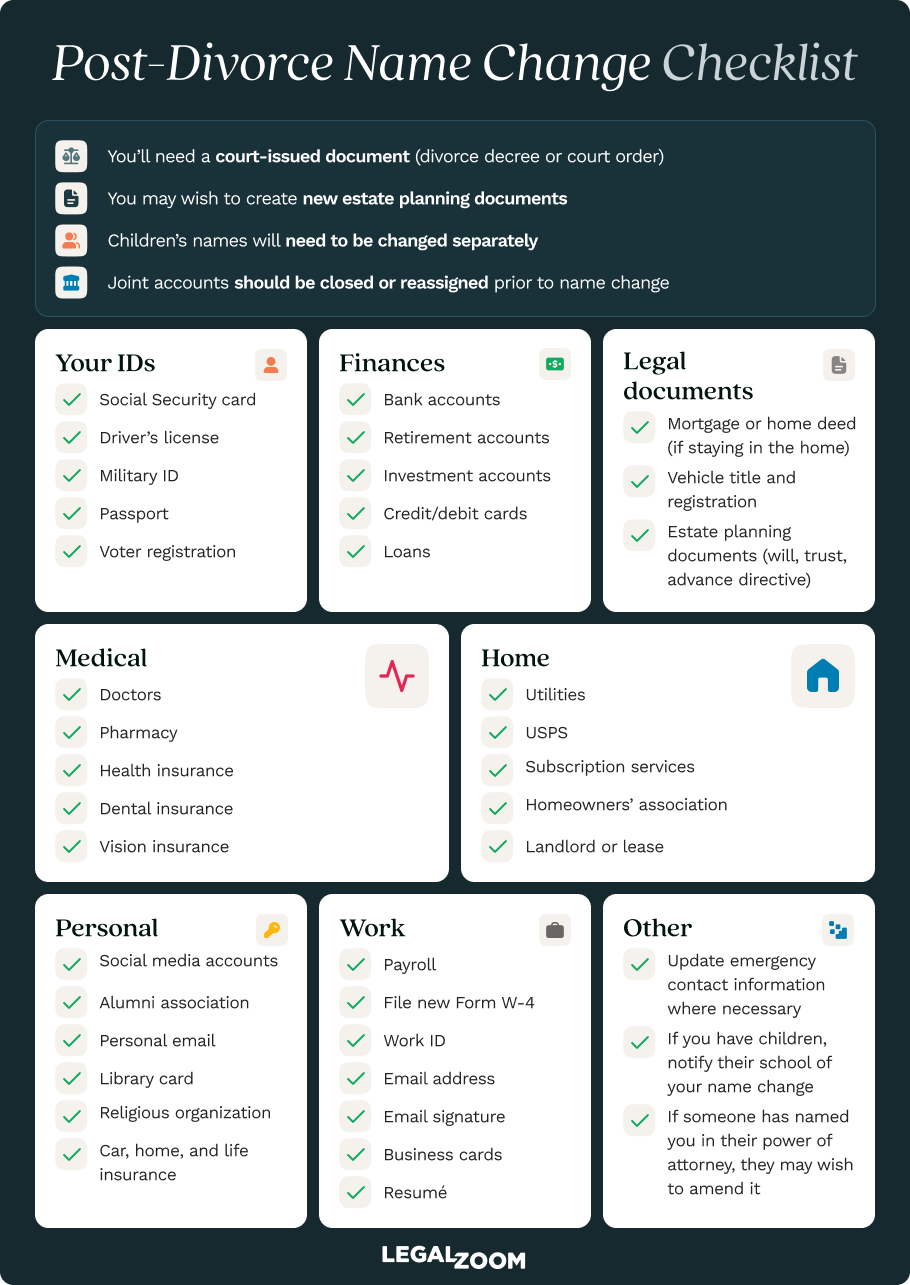A divorce decree is a final, enforceable order by the court that you and your spouse must follow. It’s the final step in the court proceeding for your divorce and contains important information about the court's decision.
A divorce decree is not the same thing as a divorce certificate, and the two documents have different purposes. The divorce certificate is issued by your state for record-keeping purposes, whereas a divorce decree is an enforceable court order detailing the terms of your divorce settlement.
Below, we'll explain what a divorce decree includes, when it's issued, how it differs from a divorce certificate, and whether you can modify it after the fact.

What is a divorce decree, and what does it include?
A divorce decree is the official court document that legally ends a marriage. Signed by a judge and stamped with an official court seal, it serves as a binding legal order that both spouses must follow. The decree specifies the final terms of the dissolution of marriage and each party's obligations, which typically include the following:
- Division of assets and debts. Allocation of property, savings, investments, retirement benefits, and responsibilities for debts.
- Spousal support (alimony). If applicable, details on financial support one spouse must provide to the other, including amount and duration.
- Child custody and support. Arrangements for the custody, caretaking, and financial support of any minor children from the marriage.
- Insurance considerations. Changes to health insurance coverage, life insurance policies, and other relevant types of coverage under both spouses’ names.
- Name changes. Official documentation of any legal name changes, such as reverting to a maiden name.
The decree can also contain other information, such as the reason(s) for divorce or a Qualified Domestic Relations Order (QDRO), depending on the marriage's circumstances or particular disputes between the spouses. Regardless of what it contains, a divorce decree goes into effect once the judge signs it, and both spouses must abide by the conditions going forward.
When do you need a divorce decree?
Given its authority, a divorce decree isn't a document you should file away and forget about. You might need to show or reference the decree in situations such as:
- Remarrying
- Selling jointly-owned property
- Holding your ex-spouse liable for not meeting their obligations
- Updating beneficiary designations on accounts
Your attorney should provide you with a copy of the decree, but if you don’t work with one, you can also follow up with the court clerk's office to request the document for your records.
When is a divorce decree issued?
A divorce case can drag on for months or even years, so finally getting to the end of the process is a long-awaited step. After you've had your trial or agreed on a settlement, the court makes a final decision and issues the decree.
How the decree is issued depends on your path to divorce:
- Trial. The judge weighs all evidence and testimony, then makes decisions on custody, alimony, child support, and property division. These decisions are written into the divorce decree.
- Settlement. Your agreement is submitted to the court in writing or spoken into the record. The judge reviews the settlement to ensure it's fair and lawful, then issues a decree reflecting its terms.
Either way, the decree becomes a binding court order that both spouses must follow.
When is a divorce decree final?
Your divorce is final on the day the court signs the divorce decree. You normally will receive it a few days later, since it is sent to your attorney, who will then send you a copy. You are legally divorced as of the date the decree is signed. This means you become a single person on that date because your marriage is legally over.
What is a divorce certificate?
It can be confusing to understand the differences between divorce decrees and divorce certificates. A divorce decree is the actual court order ending your marriage, with all the details about each party's obligations (e.g., property division, child custody, or spousal support).
If your ex doesn't follow the terms, you'll refer to the decree since it states what each party is required to do. You can go back to court to enforce the terms if there's noncompliance.
In comparison, a divorce certificate is not a court document—it's issued by your state for record-keeping purposes. It includes the parties' names, states when and where the divorce was granted, and is used in much the same way you would use a birth or marriage certificate, in the event that you need to prove you are divorced from someone.
If you seek to change your name—for example, on your driver's license or with Social Security—after the divorce, you may be asked to show a portion of the divorce decree to confirm you have authorization for the name change. While the divorce certificate is generally accepted as proof that you're divorced, the name change itself is ordered in the divorce decree; the name change may not appear on the certificate.
If you need to provide proof that the divorce occurred, for any reason other than a name change, then showing the divorce certificate should be sufficient.
Can I modify a final divorce decree?
You can modify a divorce decree under certain circumstances, though each state has its own rules and requirements for this process. Generally, one spouse must experience a significant life change that justifies a modification, such as:
- A drastic shift in income
- Loss of employment
- Relocating
- Changes to child custody needs
If you meet your state's requirements, you can request to modify your divorce decree by following these steps:
- Consult an attorney. It’s highly advisable to seek legal counsel before proceeding. A divorce attorney can provide invaluable guidance on the viability of your request and ensure you’re prepared for the court proceedings.
- File a motion. Submit a petition to the same court that issued the original decree, as well as any other documents they may require. An attorney can also help you address all necessary legal points at this stage.
- Gather supporting evidence. Collect any vital records and documents that support your request. This may include financial records, employment details, medical reports, or any other relevant information demonstrating the need for a change.
- Serve the other party. You must legally notify your ex-spouse by serving them with the court papers. However, improper service can delay your hearing, so review and follow your county’s procedures accordingly.
- Attend a court hearing. A judge will review both parties’ arguments and evidence, after which they can decide whether to grant the modification.
Modifying a divorce decree can be a complex process, and some changes can be harder to implement than others. While it’s possible to approach it on your own, an attorney is the most qualified person to present your case in the most effective way possible. In some cases, they can even help you explore alternatives to resolve disputes with your ex-spouse—such as mediation—without the need for a contentious court battle.

Final divorce decree FAQs
How do I get a copy of my divorce decree?
To request a copy of your divorce decree, contact the clerk’s office of the court where your divorce was finalized. They can provide you with a certified copy, usually for a small fee, either by mail, online, or in person.
What should I do if there are errors in my divorce decree?
If you find issues in your divorce decree, immediately contact your attorney or the court clerk. You may need to file a motion to amend or correct the decree, and a hearing might be required to address your concerns.
Is a divorce decree public record?
Yes, divorce decrees are typically considered public records accessible to anyone. However, sensitive information like Social Security numbers or financial details may be redacted. If you’re concerned about your privacy, it’s best to speak with an attorney about the possibility of sealing your divorce records.
What is another name for a divorce decree?
A divorce decree is sometimes called a divorce judgment, a final judgment of divorce, or a marital settlement agreement. Regardless of the name, it refers to the official court document that ends a marriage and outlines the terms of the separation. However, a divorce decree is not the same as a divorce certificate.
Who loses more financially in a divorce?
Financial outcomes in a divorce depend on factors like income disparity, asset division, and child custody arrangements. Generally, both parties face financial challenges, but the lower-earning spouse might experience a more significant impact without adequate support.
Brette Sember, J.D. contributed to this article.


